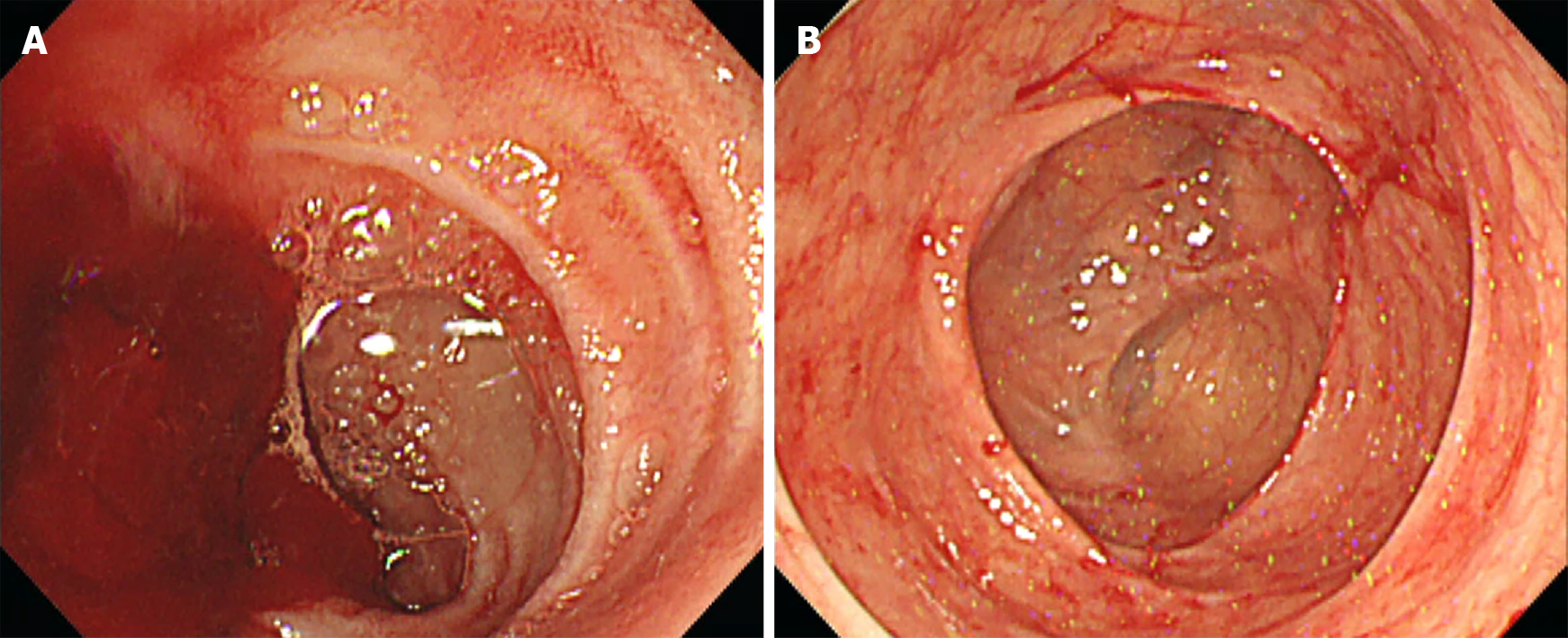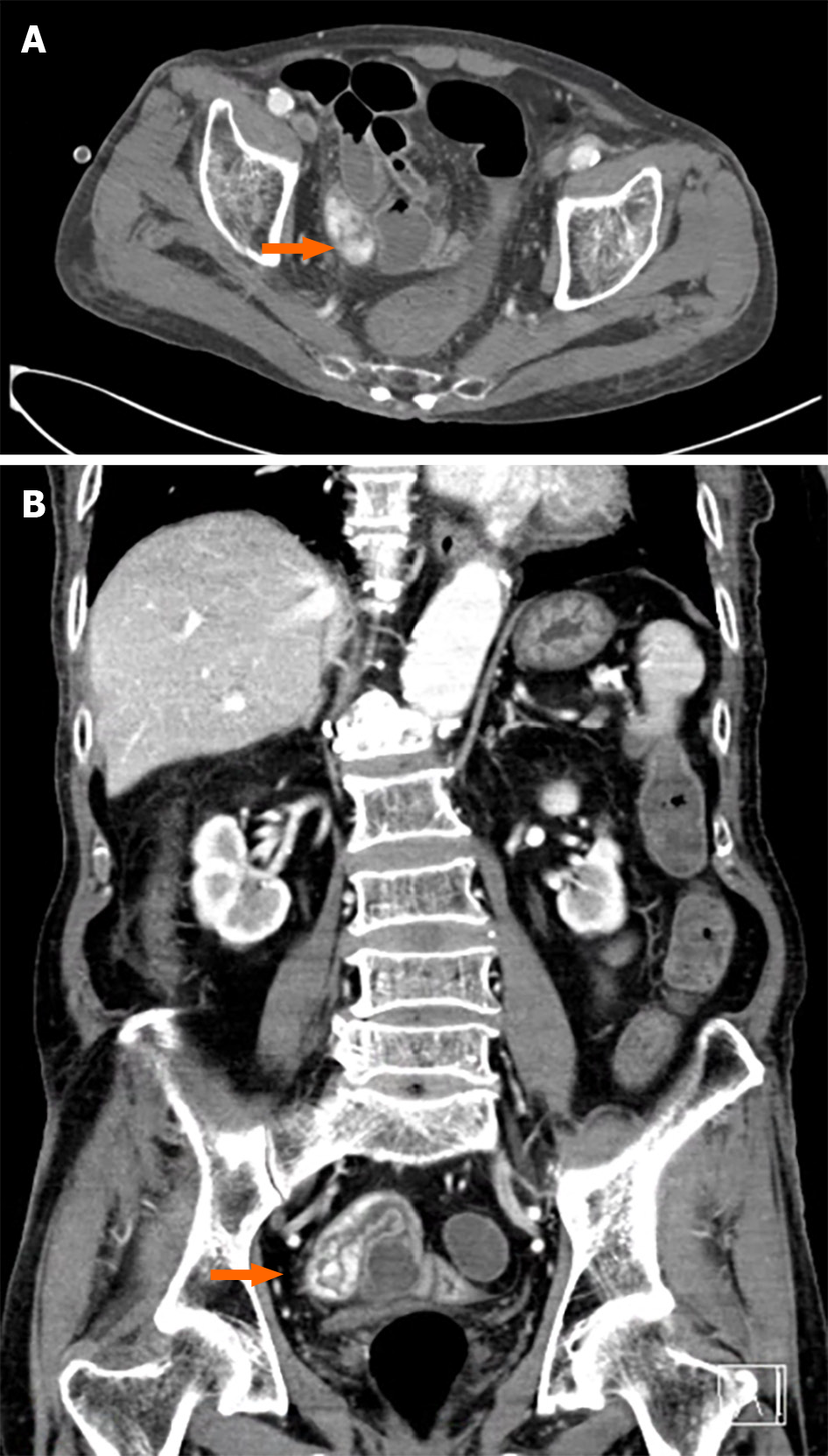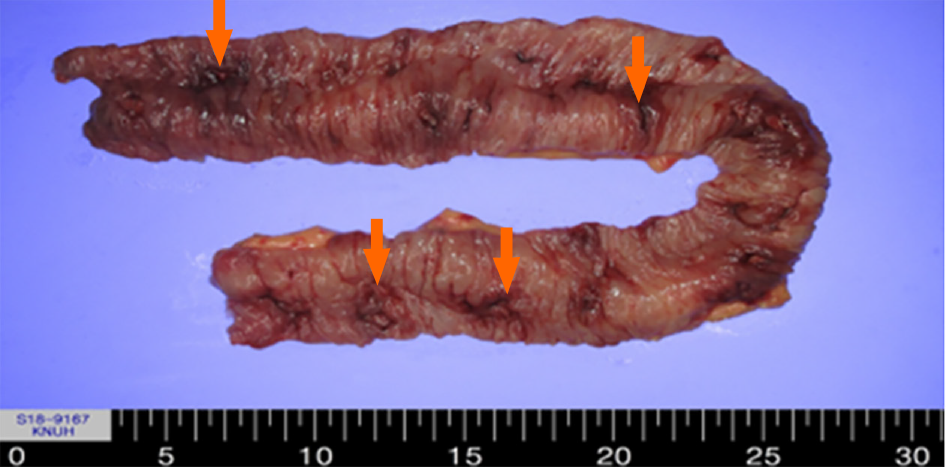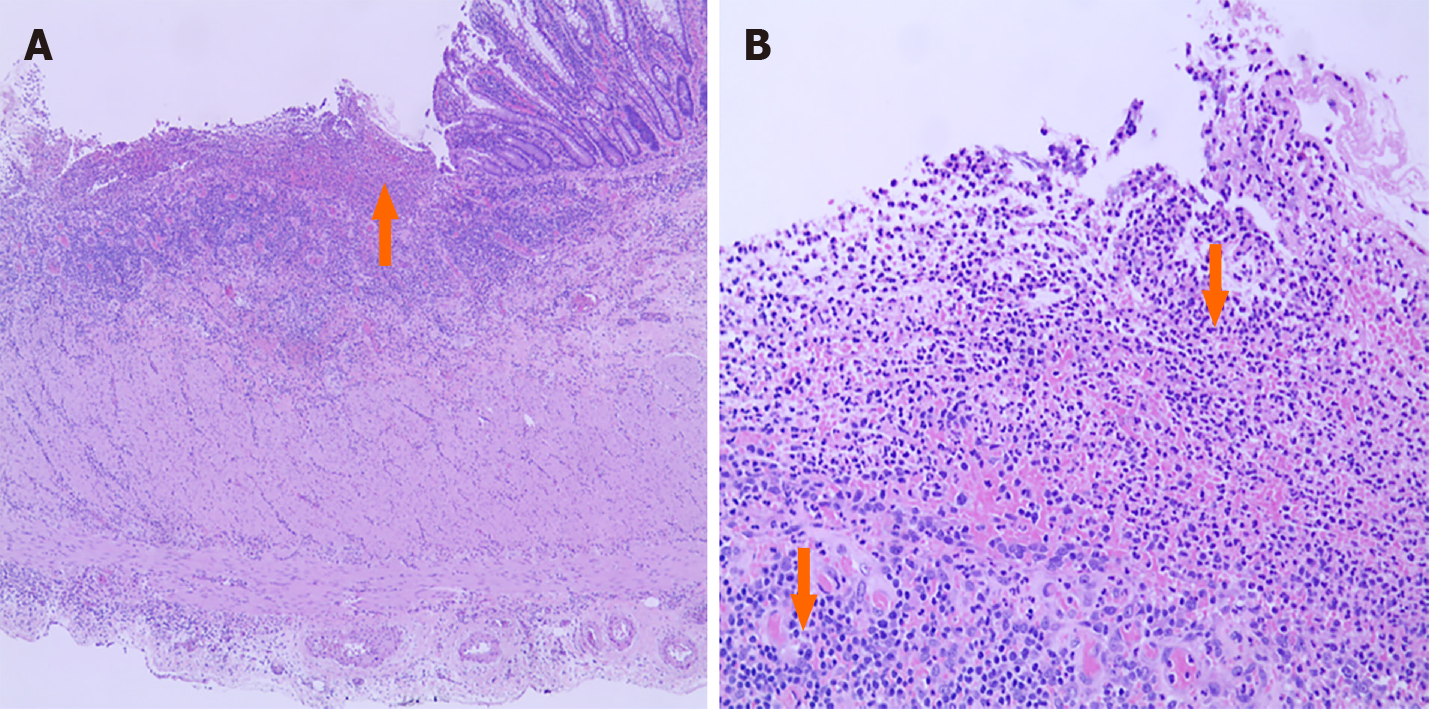Published online May 26, 2021. doi: 10.12998/wjcc.v9.i15.3689
Peer-review started: December 21, 2020
First decision: February 25, 2021
Revised: March 10, 2021
Accepted: March 25, 2021
Article in press: March 25, 2021
Published online: May 26, 2021
Processing time: 141 Days and 2.6 Hours
Clopidogrel is a platelet aggregation inhibitor used for the management of cardiovascular disease. While antiplatelet therapy decreases cardiovascular events after successful coronary drug-eluting stenting, it increases the risk of gastrointestinal (GI) bleeding. About 20% of the patients who take clopidogrel exhibit resistance to the drug.
We report the first case of a small bowel bleeding ulcer in an 86-year-old man with clopidogrel resistance. He had a history of taking clopidogrel due to unstable angina. There was no evidence of bleeding in the stomach, duodenum, or colon through upper and lower GI endoscopies. The abdominal computed tomography showed the extravasation of radiocontrast media at the ileum. Because of unstable vital signs, emergency surgery was performed. Multiple ulcers with inflammation were found in the ileum. The pathologic findings revealed simple inflammation. The VerifyNow P2Y12 test showed clopidogrel resistance. One year after changing to aspirin, capsule endoscopy was performed and the small bowel ulcers were improved.
Small bowel ulcers and bleeding due to clopidogrel are not very common, but the prevalence is expected to increase in older age patients with risk factors despite clopidogrel resistance.
Core Tip: Small bowel injury and bleeding are typical side effects of non-steroidal anti-inflammatory drugs and antiplatelet agents like aspirin. However, there are rare previous reports of small bowel injury and bleeding due to clopidogrel and the mechanisms of ulcer formation in patients receiving clopidogrel therapy are unclear. Here, we report the first case of a small bowel bleeding ulcer in an 86-year-old man with clopidogrel resistance.
- Citation: Lee SH, Ryu DR, Lee SJ, Park SC, Cho BR, Lee SK, Choi SJ, Cho HS. Small bowel ulcer bleeding due to suspected clopidogrel use in a patient with clopidogrel resistance: A case report. World J Clin Cases 2021; 9(15): 3689-3695
- URL: https://www.wjgnet.com/2307-8960/full/v9/i15/3689.htm
- DOI: https://dx.doi.org/10.12998/wjcc.v9.i15.3689
The causes of small bowel bleeding vary according to age. Tumors, Meckel’s diverticulum, Dieulafoy’s lesion, and Crohn’s disease are the common causes in young patients (< 40 years), whereas vascular lesions like angiodysplasia and small bowel lesions caused by non-steroidal anti-inflammatory drugs (NSAIDs) and antiplatelet drugs are the major cause of small bowel gastrointestinal (GI) bleeding in elderly patients (> 65 years)[1]. Small bowel injury and bleeding are typical side effects of NSAIDs and antiplatelet agents like aspirin[2]. However, small bowel bleeding caused by clopidogrel is not common. About 20% of the patients exhibit clopidogrel resistance with increased platelet activation and the resistance to this drug is associated with the risk of stent thrombosis[3]. There are no previous reports of small bowel ulcer bleeding suspected to be due to clopidogrel in a patient with clopidogrel resistance.
An 86-year-old male was admitted to our hospital with hematochezia.
The pain started 3 d ago, which was continuous cramping pain aggravated by meal, and severity of pain had increased from numeric rating scale of 3 to 8. The patient denied fevers, diarrhea or jaundice. Upon visit to the emergency room his blood pressure and heart rate were normal, but body temperature was elevated to 38 ºC.
He had a history of taking clopidogrel due to unstable angina, and aspirin or analgesics were not taken. And he had never complained of GI symptoms prior to taking clopidogrel.
He was a nonsmoker, and no notable family history was found.
Physical examinations showed pale conjunctiva and his abdomen was soft with mild lower abdominal tenderness. His initial blood pressure was 80/50 mmHg, pulse rate was 102 beats per minute, respiratory rate was 23 breaths per minute, and body temperature was 36.8 °C.
The baseline laboratory results were as follows: Hemoglobin level, 8.0 g/dL; white blood cell count, 6000/μL; platelet count, 185000/μL; blood urea nitrogen, 25.6 mg/dL; and C-reactive protein, 1.7 mg/dL. The levels of other routine blood chemistry markers were within the reference limits.
The levels of other routine blood chemistry markers were within the reference limits. Upper and lower gastrointestinal endoscopy were performed and upper gastrointestinal bleeding was excluded. However, in the lower gastrointestinal endoscopic findings, small bowel bleeding was suspected as the cause of the hematochezia (Figure 1). The abdominal computed tomography showed the extravasation of radiocontrast media at the ileum (Figure 2).
Final diagnosis was small bowel ulcer bleeding due to clopidogrel resistance.
Because of unstable vital signs, emergency surgery was performed. Multiple ulcers with inflammation were found in the ileum (Figure 3). The pathologic findings revealed simple inflammation (Figure 4). VeryfyNow P2Y12 testing was performed to check the clopidogrel response (365PRU), and the results showed clopidogrel resistance.
The patient was prescribed aspirin instead of clopidogrel. There were no complaining symptoms. One year after discharge, capsule endoscopy was performed and the small bowel ulcers were improved (Figure 5).
This is the first report of a small bowel ulcer bleeding, which was suspected to be due to clopidogrel use in a patient with clopidogrel resistance. Clopidogrel, a second-generation oral thienopyridine is most commonly used as dual antiplatelet therapy with aspirin for the treatment of cardiovascular disease[4]. However, despite the use of clopidogrel, a considerable number of patients continue to have cardiovascular events. This phenomenon is called clopidogrel resistance and reflects the failure of the molecule to inhibit the target of its action.
With respect to clopidogrel resistance, accumulating data from numerous clinical studies underscore the importance of high on-treatment platelet reactivity (HPR) as a prognostic risk factor. There are several methods to evaluate the platelet response to clopidogrel. Ex vivo measurements of ADP-induced platelet aggregation by light transmittance aggregometry is the most commonly used gold standard method[5].
VerifyNow is a simple, rapid, point-of-care test with the advantages of small sample volume, the use of whole blood, and no pipetting. The test is used to assess the effect of clopidogrel resistance on the P2Y12 inhibition of platelet function[6].
When HPR was defined as 5 and 20 μmol/L adenosine diphosphate-induced maximal platelet aggregation of ≥ 46% and ≥ 59%, respectively, and P2Y12 reaction units of ≥ 235, HPR determined by light transmittance aggregometry and VeryfiNow P2Y12 were well-matched, and the risk stratification between the two methods showed strong agreement[7].
The small bowel is a rare site of GI bleeding and a common site of obscure GI bleeding. It became possible to examine the small intestine through as double balloon endoscopy and capsule endoscopy[8,9].According to previous studies, the incidence of small bowel ulcers and bleeding due to NSAIDs was about eight times higher than that of patients who did not take NSAIDs[10]. Low-dose aspirin has been reported to cause small bowel injury and 57.6% of the chronic users had mucosal breaks[11]. The crude risk of GI events in patients taking no antiplatelet therapy was 1.6%. The risk in aspirin users was 4.1%. The risk in clopidogrel users was 6.1%, and the risk in patients on both agents was 6.6%[12]. In a large cohort study, in over 75000 patients who took clopidogrel, the long-term risk of GI events like bleeding, ulcer, and erosion increased from 2% to 6%, comparing never-users with users[13]. However, this study had an observational design and included all GI bleeding. There is no mention of clopidogrel resisitance, so the difference in interstinal ulceration with or without clopidogrel resistance is unknown.
Some studies suggested that phospholipids and mitochondria in the intestinal cells are directly damaged by cyclooxygenase inhibition from NSAIDs. This result induces a decrease in energy synthesis and the generation of free radicals. Then, intercellular junctions are disrupted and intestinal permeability is increased[14]. Another report suggested that the intestinal mucosal barrier is damaged by intraluminal contents such as bile acid, food, bacteria, and enzymes as a result of inflammation that occurs when neutrophils are activated[15]. There are rare previous reports of small bowel injury and bleeding due to clopidogrel and the mechanisms of ulcer formation in patients receiving clopidogrel therapy are unclear.
However, it has been hypothesized that an impairment in ulcer healing by adenosine diphosphate (ADP) receptor antagonists may cause gastrointestinal injury[16]. Platelet aggregation may play an important role in ulcer healing through the release of platelet-derived growth factors that promote angiogenesis and ulcer healing. ADP receptor antagonists may impair gastric ulcer healing by suppressing the release of platelet-derived growth factors[17].
To the best of our knowledge, small bowel ulcer bleeding in patients with clopidogrel resistance has not been reported. Theoretically, clopidogrel cannot cause GI bleeding including small bowel injury in patients with clopidogrel resistance. In this case, there were no specific medications leading to GI bleeding and simple inflammation with no specific disease was found in the histologic examination. Clopidogrel resistance was confirmed by VeryfyNow P2Y12 testing. These results led to the diagnosis of small intestinal ulcers and bleeding associated by clopidogrel. After undergoing an operation and changing clopidogrel to aspirin, the patient's symptoms and blood tests improved, so it could be expected that intestinal bleeding no longer occurred in the patient. However, capsule endoscopy was performed to completely exclude small bowel ulceration, and it was confirmed that small bowel ulceration did not occur. This supports our opinion even though we do not know the exact mechanism of small bowel bleeding in this patient with clopidogrel resistance.
The mechanisms of clopidogrel resistance are not fully elucidated but there are several opinions on the mechanism for clopidogrel resistance. First opinion includes inappropriate dosing or underdosing of clopidogrel and drug–drug interactions between clopidogrel and other drugs. Second opinion may be hepatic conversion of the active metabolite by cytochrome CYP2C19. Third opinion could include variable intestinal absorption of the prodrug or clearance of the active metabolite. Otherwise, ABC1 activity, increased release of ADP and platelet receptor polymorphisms have been suggested[18]. In this case, these mechanisms might cause inappropriate concentration and action of active metabolite of clopidogrel and lead to ulceration and bleeding of small bowel.
In conclusion, we reported the first case of a small bowel ulcer bleeding, which was suspected to be due to clopidogrel use in a patient with clopidogrel resistance. Small bowel ulcers and bleeding due to clopidogrel are not very common, but the prevalence is expected to increase in older age patients with risk factors despite clopidogrel resistance.
Manuscript source: Unsolicited manuscript
Specialty type: Gastroenterology and hepatology
Country/Territory of origin: South Korea
Peer-review report’s scientific quality classification
Grade A (Excellent): 0
Grade B (Very good): 0
Grade C (Good): C
Grade D (Fair): 0
Grade E (Poor): 0
P-Reviewer: Zheng YX S-Editor: Zhang H L-Editor: A P-Editor: Li X
| 1. | Zhang BL, Chen CX, Li YM. Capsule endoscopy examination identifies different leading causes of obscure gastrointestinal bleeding in patients of different ages. Turk J Gastroenterol. 2012;23:220-225. [RCA] [PubMed] [DOI] [Full Text] [Cited by in Crossref: 32] [Cited by in RCA: 35] [Article Influence: 2.9] [Reference Citation Analysis (0)] |
| 2. | Scarpignato C, Bjarnason I. Drug-Induced Small Bowel Injury: a Challenging and Often Forgotten Clinical Condition. Curr Gastroenterol Rep. 2019;21:55. [RCA] [PubMed] [DOI] [Full Text] [Cited by in Crossref: 27] [Cited by in RCA: 35] [Article Influence: 5.8] [Reference Citation Analysis (0)] |
| 3. | Breet NJ, van Werkum JW, Bouman HJ, Kelder JC, Ruven HJ, Bal ET, Deneer VH, Harmsze AM, van der Heyden JA, Rensing BJ, Suttorp MJ, Hackeng CM, ten Berg JM. Comparison of platelet function tests in predicting clinical outcome in patients undergoing coronary stent implantation. JAMA. 2010;303:754-762. [RCA] [PubMed] [DOI] [Full Text] [Cited by in Crossref: 647] [Cited by in RCA: 647] [Article Influence: 43.1] [Reference Citation Analysis (0)] |
| 4. | Fox KA, Mehta SR, Peters R, Zhao F, Lakkis N, Gersh BJ, Yusuf S; Clopidogrel in Unstable angina to prevent Recurrent ischemic Events Trial. Benefits and risks of the combination of clopidogrel and aspirin in patients undergoing surgical revascularization for non-ST-elevation acute coronary syndrome: the Clopidogrel in Unstable angina to prevent Recurrent ischemic Events (CURE) Trial. Circulation. 2004;110:1202-1208. [RCA] [PubMed] [DOI] [Full Text] [Cited by in Crossref: 611] [Cited by in RCA: 601] [Article Influence: 28.6] [Reference Citation Analysis (0)] |
| 5. | Smock KJ, Saunders PJ, Rodgers GM, Johari V. Laboratory evaluation of clopidogrel responsiveness by platelet function and genetic methods. Am J Hematol. 2011;86:1032-1034. [RCA] [PubMed] [DOI] [Full Text] [Cited by in Crossref: 19] [Cited by in RCA: 21] [Article Influence: 1.5] [Reference Citation Analysis (0)] |
| 6. | Gasparyan AY. Aspirin and clopidogrel resistance: methodological challenges and opportunities. Vasc Health Risk Manag. 2010;6:109-112. [RCA] [PubMed] [DOI] [Full Text] [Full Text (PDF)] [Cited by in Crossref: 31] [Cited by in RCA: 34] [Article Influence: 2.3] [Reference Citation Analysis (0)] |
| 7. | Jeong YH, Bliden KP, Antonino MJ, Park KS, Tantry US, Gurbel PA. Usefulness of the VerifyNow P2Y12 assay to evaluate the antiplatelet effects of ticagrelor and clopidogrel therapies. Am Heart J. 2012;164:35-42. [RCA] [PubMed] [DOI] [Full Text] [Cited by in Crossref: 57] [Cited by in RCA: 72] [Article Influence: 5.5] [Reference Citation Analysis (0)] |
| 8. | Iwamoto J, Mizokami Y, Saito Y, Shimokobe K, Honda A, Ikegami T, Matsuzaki Y. Small-bowel mucosal injuries in low-dose aspirin users with obscure gastrointestinal bleeding. World J Gastroenterol. 2014;20:13133-13138. [RCA] [PubMed] [DOI] [Full Text] [Full Text (PDF)] [Cited by in CrossRef: 25] [Cited by in RCA: 23] [Article Influence: 2.1] [Reference Citation Analysis (0)] |
| 9. | Koffas A, Laskaratos FM, Epstein O. Non-small bowel lesion detection at small bowel capsule endoscopy: A comprehensive literature review. World J Clin Cases. 2018;6:901-907. [RCA] [PubMed] [DOI] [Full Text] [Full Text (PDF)] [Cited by in CrossRef: 9] [Cited by in RCA: 9] [Article Influence: 1.3] [Reference Citation Analysis (0)] |
| 10. | Allison MC, Howatson AG, Torrance CJ, Lee FD, Russell RI. Gastrointestinal damage associated with the use of nonsteroidal antiinflammatory drugs. N Engl J Med. 1992;327:749-754. [RCA] [PubMed] [DOI] [Full Text] [Cited by in Crossref: 718] [Cited by in RCA: 674] [Article Influence: 20.4] [Reference Citation Analysis (0)] |
| 11. | Ebi M, Inoue S, Sugiyama T, Yamamoto K, Adachi K, Yoshimine T, Yamaguchi Y, Tamura Y, Izawa S, Hijikata Y, Funaki Y, Ogasawara N, Sasaki M, Kasugai K. A Small Bowel Ulcer due to Clopidogrel with Cytomegalovirus Enteritis Diagnosed by Capsule and Double-Balloon Endoscopy. Case Rep Gastroenterol. 2018;12:303-310. [RCA] [PubMed] [DOI] [Full Text] [Full Text (PDF)] [Cited by in Crossref: 2] [Cited by in RCA: 2] [Article Influence: 0.3] [Reference Citation Analysis (0)] |
| 12. | Nikolsky E, Stone GW, Kirtane AJ, Dangas GD, Lansky AJ, McLaurin B, Lincoff AM, Feit F, Moses JW, Fahy M, Manoukian SV, White HD, Ohman EM, Bertrand ME, Cox DA, Mehran R. Gastrointestinal bleeding in patients with acute coronary syndromes: incidence, predictors, and clinical implications: analysis from the ACUITY (Acute Catheterization and Urgent Intervention Triage Strategy) trial. J Am Coll Cardiol. 2009;54:1293-1302. [RCA] [PubMed] [DOI] [Full Text] [Cited by in Crossref: 131] [Cited by in RCA: 156] [Article Influence: 9.8] [Reference Citation Analysis (0)] |
| 13. | Grove EL, Würtz M, Schwarz P, Jørgensen NR, Vestergaard P. Gastrointestinal events with clopidogrel: a nationwide population-based cohort study. J Gen Intern Med. 2013;28:216-222. [RCA] [PubMed] [DOI] [Full Text] [Cited by in Crossref: 22] [Cited by in RCA: 21] [Article Influence: 1.8] [Reference Citation Analysis (0)] |
| 14. | Fortun PJ, Hawkey CJ. Nonsteroidal antiinflammatory drugs and the small intestine. Curr Opin Gastroenterol. 2007;23:134-141. [RCA] [PubMed] [DOI] [Full Text] [Cited by in Crossref: 9] [Cited by in RCA: 26] [Article Influence: 1.4] [Reference Citation Analysis (1)] |
| 15. | Wallace JL. NSAID gastropathy and enteropathy: distinct pathogenesis likely necessitates distinct prevention strategies. Br J Pharmacol. 2012;165:67-74. [RCA] [PubMed] [DOI] [Full Text] [Cited by in Crossref: 105] [Cited by in RCA: 112] [Article Influence: 8.6] [Reference Citation Analysis (0)] |
| 16. | Cryer B. Management of patients with high gastrointestinal risk on antiplatelet therapy. Gastroenterol Clin North Am. 2009;38:289-303. [RCA] [PubMed] [DOI] [Full Text] [Cited by in Crossref: 20] [Cited by in RCA: 21] [Article Influence: 1.3] [Reference Citation Analysis (0)] |
| 17. | Ma L, Elliott SN, Cirino G, Buret A, Ignarro LJ, Wallace JL. Platelets modulate gastric ulcer healing: role of endostatin and vascular endothelial growth factor release. Proc Natl Acad Sci USA. 2001;98:6470-6475. [RCA] [PubMed] [DOI] [Full Text] [Cited by in Crossref: 168] [Cited by in RCA: 175] [Article Influence: 7.3] [Reference Citation Analysis (1)] |
| 18. | Angiolillo DJ, Fernandez-Ortiz A, Bernardo E, Alfonso F, Macaya C, Bass TA, Costa MA. Variability in individual responsiveness to clopidogrel: clinical implications, management, and future perspectives. J Am Coll Cardiol. 2007;49:1505-1516. [RCA] [PubMed] [DOI] [Full Text] [Cited by in Crossref: 731] [Cited by in RCA: 751] [Article Influence: 41.7] [Reference Citation Analysis (0)] |













